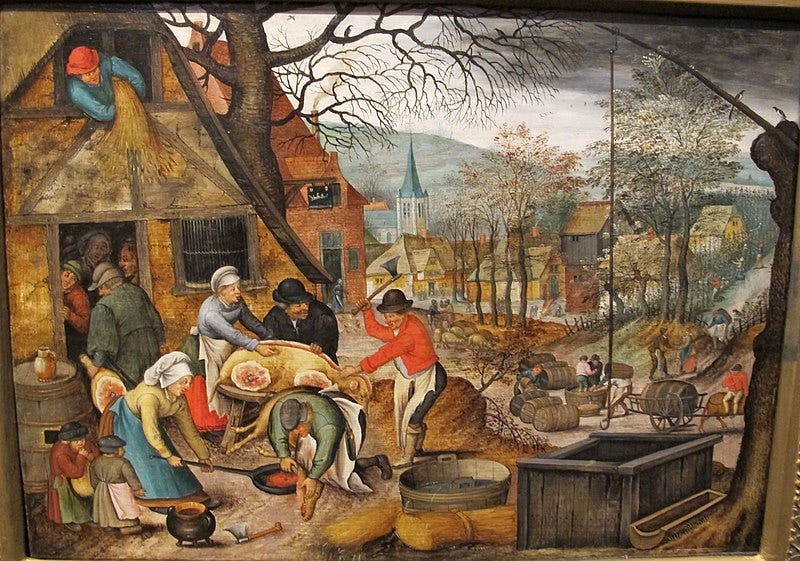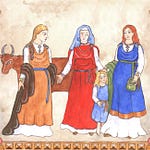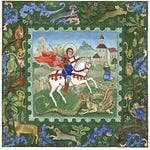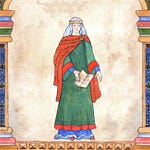Ælfgif-who? provides short biographies of early medieval English women. Click on the podcast player if you’d like to hear this newsletter read aloud in my appealing Yorkshire accent.
On the eve of Blotmonath, the month of animal sacrifice
In northern Europe, Halloween occurs when the days are rapidly shortening, the first frosts harden the earth, and the trees undress to reveal their skeletons. But there have long been comparable celebrations at this time of year - in Ireland Samhain, in Wales Nos Calan Gaeaf, and in Scandinavia ‘Winter Nights’. These festivals, like many folk celebrations, occur at a time of transition. In early autumn, the hard work of the harvest season is over, and food is plentiful. But November ushers in the most deadly season, the coming Winter months when food will be scarcest and the nights coldest. For this reason, this time of year has taken on associations with evil spirits.
The origin of modern halloween is in the eve of the Christian feast of All Hallows, celebrated on 1 November, when Christian saints are commemorated. This feast has its origins in ninth-century England. It is often said that All Hallows was a Christian appropriation of earlier Celtic festivals of the dead. However, folklore historian Ronald Hutton has been careful to stress that there is no evidence that earlier Celtic celebrations had any association with the dead until Christianity’s involvement.
The earlier antecedent of this November festival is not concerned with the dead, so much as the act of killing. The eighth-century Northumbrian monk Bede tells us that to the pre-Christian English, November was known as ‘Blotmonath’, when the cattle were slaughtered and dedicated to the pagan gods.
The name comes from the Old English word ‘blot’, meaning sacrifice, and ‘monath’, the origin of the word month. There has been some confusion over this name, because of how similar ‘blot’ is to ‘blod’, the Old English word for blood. That has led to many mistakenly referring to this month as ‘Blood month’, which sounds suitably goth, but isn’t really accurate.
Bede gives us no other clues as to what this practice entailed, which gods were honoured with the sacrifice, and how exactly the animals were consecrated. As always, the Christian monk Bede is a tricky source on pre-Christian ritual, as interested as he was in condemning all non-Christian practice. Sadly, the people who he discusses did not leave behind written records.
One good indication that ritual animal sacrifice to pagan gods was indeed practiced is the attempts by Christians to suppress it. The Penitential of Theodore, a handbook associated with Archbishop Theodore of Canterbury, who was originally from Tarsus, states that ‘If a man sacrifices something trivial to the devils, he is to fast one year. If he sacrifices something substantial, he is to fast ten winters’.
The killing of animals in autumn was not only a religious sacrifice but a practical feature of medieval animal husbandry. The stocks of food that were available after harvest time had to last the whole winter - that meant feeding grain to animals was impractical. Following the fattening of the summer months, autumn was the perfect time to kill livestock to eat, rather than during the lean winter. Within households, this was a job that was often taken up by women.
(However, one archaeological site reveals an animal sacrifice where the animal was not eaten - rather it was left whole. December’s newsletter will look at various high-status women buried in a sixth-century cemetery in Oakington, Cambridgeshire - one of whom was laid to rest with a whole, skinned adult cow. The meaning of this is hard to ascertain given it is the only example of a cow buried with a human in Europe!)
Many of us in northern climes have lost our sense of the drama of this time in the agricultural year, with imported ingredients, long-life foods and greenhouse-grown crops now available throughout the winter months. Though we often complain that Halloween is, in its modern iteration, a rather commercial celebration, it is worth remembering that partaking in spooky seasonal festivities is as ancient a tradition as any. I should add the disclaimer that this is by no means an invitation to revive animal sacrifice!
Further reading:
Ronald Hutton - Halloween? It’s more than trick or treat (The Guardian, 2014)
Ronald Hutton - Stations of the Sun (OUP, 1996)
Bede’s Reckoning of Time, translated by Faith Wallis













Share this post